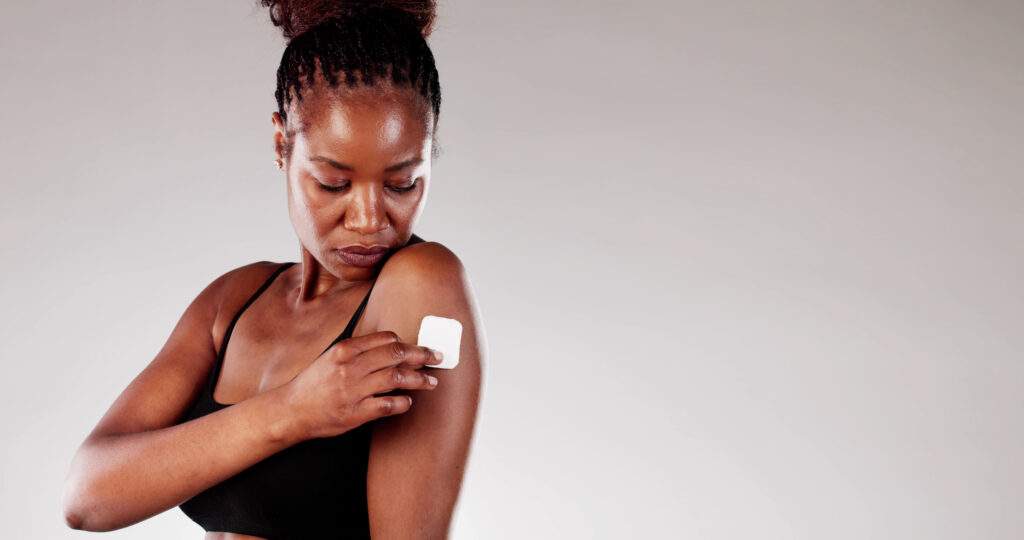Hormone replacement therapy (HRT) is a treatment used to restore hormones when the body is no longer producing them in the amounts needed for healthy function. While it is commonly used to help manage menopausal symptoms, HRT can also be prescribed for individuals with naturally low hormone levels, hormone deficiencies resulting from medical treatment or surgery.
HRT may help relieve symptoms such as temperature changes, mood swings, low energy, sleep disturbances, and changes in sexual wellbeing, and can also effectively reduce menopausal symptoms. It can also support long-term bone health and overall quality of life. Treatment options vary and include tablets, patches, gels, sprays, and vaginal formulations.
The most suitable type and dosage of HRT depend on factors such as medical history, treatment goals, and hormone levels. It is important to speak with a healthcare provider to determine whether taking HRT is appropriate for your individual needs.
How Is Hormone Replacement Therapy Used?
Hormones play a key role in regulating many functions in the body, from metabolism and energy levels to mood, sleep, sexual health and bone strength. When hormone levels fall below what the body needs, whether due to ageing, surgical removal of glands, certain medical treatments, or naturally low hormone production, it can lead to a range of physical and emotional symptoms. In these situations, hormone replacement therapy may be used to restore balance.
Rather than being limited to menopause management, replacement therapy is used in several contexts where tailored hormone support can help maintain health and day-to-day well-being. HRT can be tailored to meet different health needs, and the reasons for using it vary from person to person.
Some common situations where HRT may be considered include:
Menopause and Perimenopause
During menopause and the years leading up to it (perimenopause), the ovaries gradually produce less oestrogen and progesterone. This hormonal shift can cause menopause symptoms such as hot flashes, night sweats, mood fluctuations, and changes to sleep patterns. HRT can help stabilise these symptoms by restoring hormone levels, which may also support vaginal comfort, sexual wellbeing, and bladder health.
In addition, HRT can play an important role in helping protect bone density and reducing the long-term risk of osteoporosis, particularly in post-menopausal women.
Androgen (Testosterone) Replacement Therapy
Testosterone replacement therapy may be prescribed for individuals with clinically low testosterone levels (hypogonadism). Low testosterone can affect energy, mood, muscle strength, motivation, and libido. Carefully monitored testosterone therapy can help restore hormones to optimal ranges. Treatment typically involves regular blood tests and clinical review to ensure safe and effective dosing.
Post-Surgical or Medical Hormone Deficiency
Some people experience reduced hormone production after surgery (such as removal of the ovaries or testes), after certain cancer treatments, or due to conditions such as primary ovarian insufficiency. In these situations, HRT may be used to restore hormonal levels, support cardiovascular health and bone strength, and maintain daily well-being.

Ways Hormone Replacement Therapy (HRT) Can Be Delivered
Hormone replacement therapy can be delivered in several different treatment options. The best option depends on your hormone levels, symptoms, medical history and personal preference.
Testosterone therapy has its own formats chosen for consistency and dose control.
Tablets / Capsules (Oral Medication)
Oral oestrogen therapy and combined HRT tablets are commonly used. Because they pass through the liver, oral forms may slightly increase the risk of blood clots for some individuals.
Transdermal Patches
Patches deliver hormones through the skin and may have a lower health risk of clotting compared to tablets.
Sublingual Troches
Absorption through the mouth bypasses the digestive tract, which can be beneficial for those with sensitive stomachs or liver conditions.
Topical Gels and Sprays
Applied to the skin daily. Used for both oestrogen and testosterone. Consistent application is important to maintain stable hormone levels.
Vaginal Creams, Rings, or Tablets
Used for vaginal dryness and discomfort. These forms act locally and generally do not affect whole-body hormone levels.
Intrauterine Device (IUD)
An IUD, such as Mirena, releases progestogen to protect the uterine lining and may reduce vaginal bleeding.
Forms Used for Testosterone Replacement
Testosterone therapy can be prescribed in a variety of delivery forms, including:
- Gels and creams
- Patches
- Short-acting and long-acting injections
Regular monitoring ensures levels remain safe and therapeutic.
Interested in Hormone Replacement Therapy (HRT)? Contact McKenzies Compounding Chemist Today!
HRT is a personalised treatment approach that can support comfort, wellbeing, and long-term health when hormones are not being produced at the levels your body needs. Whether you are experiencing menopause, managing low testosterone, or seeking care after medical or surgical changes, the right formulation and dosage make a meaningful difference. McKenzies Compounding Chemist works closely with healthcare providers to prepare tailored hormone therapies to suit individual needs.
If you are considering HRT or would like more information, speak with our friendly team today. We’re here to support your next step with confidence and care.

